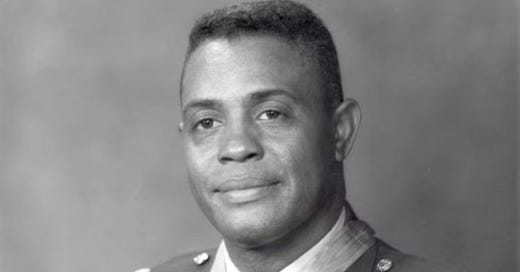Notes from New Washington (3): war on words
More things you may have missed in the onslaught of nonsense in Washington, DC
Banishment of the ‘Code Talkers’
March 18: The indigenous people of North America have suffered a setback of historic importance in the Trump administration’s administration of injustice.
During World War Two, the work of the “Code Talkers” was crucial in various battles, not least the liberation of the island Iwo Jima from the Japanese. Navajo service officers relayed crucial intelligence in their own language, knowing that it lacked a written form and that it would be impossible for the enemy to decipher.
Now, according to the news service Axios, the pages on US military websites commemorating their achievements have disappeared. Broken URLs are now labelled “DEI”, among the things banned by the thought police of New Washington. (At least there’s still one on the CIA website.)
They weren’t alone in the purge. So too were pages detailing the contributions of black soldiers, the women who served as pilots in the Air Force during World War Two. A black major general and Medal of Honor winner in Vietnam suffered a similar fate. According to historian Helen Cox Richardson’s account,
A profile of Army Major General Charles Rogers, who received the Medal of Honor for his service in Vietnam, was similarly changed, but the Defense Department replaced the missing page and removed “dei” from the URL today after a public outcry.
The Trump purge of all things “diversity, equity and inclusion” related has led to such silliness.
The shrinking vocabulary of political discourse
March 7: One sign of intelligence is the use of a wide and nuanced vocabulary (Bloom, 2001; Jensen, 2001). In New Washington, suddenly, the range of words in use is shrinking. The War on “Woke” is also a war on words.
The New York Times reported on orders that around 200 words and phrases should no longer appear in government guidelines. Among them:
Pronoun,
Injustice,
Segregation,
Immigrants, and (of course)
Gulf of Mexico
This would be just plain silly if it wasn’t so serious.
Bloom, P. (2001). Précis of How Children Learn the Meanings of Words. Behavioral and Brain Sciences, 24(6), 1095-1103. doi:10.1017/S0140525X01000139
Jensen, A. R. (2001). Vocabulary and general intelligence. Behavioral and Brain Sciences, 24(6), 1109-1110. doi:10.1017/S0140525X01280133
![How to govern [not like that]](https://substackcdn.com/image/fetch/$s_!emEQ!,w_80,h_80,c_fill,f_auto,q_auto:good,fl_progressive:steep,g_auto/https%3A%2F%2Fsubstack-post-media.s3.amazonaws.com%2Fpublic%2Fimages%2Fa9d7f587-4c16-42f0-9526-b00edc0ab4c8_155x155.png)
![How to govern [not like that]](https://substackcdn.com/image/fetch/$s_!Te2X!,e_trim:10:white/e_trim:10:transparent/h_72,c_limit,f_auto,q_auto:good,fl_progressive:steep/https%3A%2F%2Fsubstack-post-media.s3.amazonaws.com%2Fpublic%2Fimages%2F51c6c618-ff5a-481b-b4e2-28047c606ca8_990x369.jpeg)

![How to govern [not like that]](https://substackcdn.com/image/fetch/$s_!emEQ!,w_36,h_36,c_fill,f_auto,q_auto:good,fl_progressive:steep,g_auto/https%3A%2F%2Fsubstack-post-media.s3.amazonaws.com%2Fpublic%2Fimages%2Fa9d7f587-4c16-42f0-9526-b00edc0ab4c8_155x155.png)

